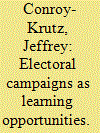|
|
|
Sort Order |
|
|
|
Items / Page
|
|
|
|
|
|
|
| Srl | Item |
| 1 |
ID:
147233


|
|
|
|
|
| Summary/Abstract |
While scholars have studied various aspects of election campaigns, they have not examined their effects on political knowledge in Africa. Since many problems are blamed on information scarcity, campaign-related learning could affect democratic development positively. This article focuses on the case of Uganda, using unique panel data from the 2010–11 campaign. I find that knowledge on office holders, candidates, and institutions increased significantly over the campaign. Importantly, these increases were not concentrated amongst the previously privileged, but also occurred amongst often-disadvantaged groups, such as women, the poor, the less-educated, and rural dwellers. In fact, the campaign seems to have diminished, although not eliminated, pre-existing knowledge gaps between advantaged and disadvantaged populations. It does not appear that Ugandans learned because the campaign made them more excited about politics, but rather because they were exposed to political communications, door-to-door canvassing, and increasingly politicized media content. Finally, knowledge increases are significantly correlated with increased criticism of institutions, but not with increased support for democracy or participation. While we cannot generalize to the rest of the continent, given that interest in a non-competitive campaign like Uganda's might be relatively limited, we might expect similar or larger learning effects in more-democratic settings.
|
|
|
|
|
|
|
|
|
|
|
|
|
|
|
|
| 2 |
ID:
120910


|
|
|
|
|
| Publication |
2012.
|
| Summary/Abstract |
In February 2011, Ugandan President Yoweri Museveni resoundingly won re-election. In the aftermath of the vote, which many had predicted would be competitive, analysts and opposition supporters ascribed Museveni's victory to massive pre-election spending on public goods, creation of new administrative districts, and vote buying. While the opposition could not compete with Museveni and his National Resistance Movement in access to resources, our analyses of survey data, from two pre-election surveys conducted by Afrobarometer in November/December 2010 and January 2011, and a pre- and post-election panel study, find little evidence that Museveni benefited significantly from public goods outlays, district creation, and vote buying. Additionally, we find little evidence that fear and intimidation were responsible for the results. Instead, the data suggest that Museveni's re-election was driven by an uninspiring opposition slate, widespread satisfaction with macro-economic growth, and an improved security situation, particularly in the Northern Region.
|
|
|
|
|
|
|
|
|
|
|
|
|
|
|
|
|
|
|
|
|